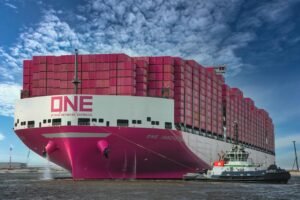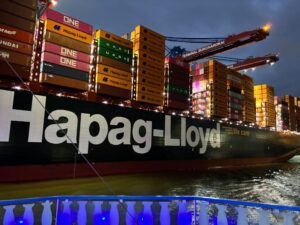Danish owner A.P. Moller – Maersk (Maersk), says first-quarter profit this year was as expected, citing strong container shipping demand and the diverting of vessels around Africa to avoid the Red Sea.
The Copenhagen-based company, viewed as a barometer of world trade, said results were driven by a good performance in terminals and the combination of higher demand and a prolonged Red Sea crisis.
The Danish logistics and shipping group Mærsk has reported that Ebit decreased to $177m in the first quarter of the year, a drop from the same period the year before. Specifically, Ebit decreased by $2.1bn to $177m ($2.3bn).
Its revenue also decreased by $1.9bn to $12.4bn, compared to $14.2bn the same period of 2023, stemming from Ocean, with an increase in logistics and services and in terminals of $33m and $123m, respectively.
The owner posted that Ebitda decreased to $1.6bn compared to $4.0bn in 2023, whilst the company’s underlying profit was $210m ($2.6bn).
The company after delivering a first quarter in line with expectations, showing a strong recovery in earnings compared to the fourth quarter of 2023, raises its expectations for the coming months.
Maersk said it now raises the lower end of its financial guidance with an underlying Ebitda in the range of $4bn and $6bn, and an underlying Ebit in the range of negative $2.0-0.0bn.
With the Red Sea crisis still ongoing, plans are made for the current rerouting south of the Cape of Good Hope to be extended potentially for the remainder of the year, while A.P. Moller – Maersk still expects overcapacity to prevail which implies lower rates during the second half.
Vincent Clerc, chief executive of Maersk, said: “We had a positive start to the year with a first quarter developing precisely as we expected. Demand is trending towards the higher end of our market growth guidance and conditions in the Red Sea remain entrenched. This not only supported a recovery in the first quarter compared to the previous quarter, but also provide an improved outlook for the coming quarters, as we now expect these conditions to stay with us for most of the year.
“However, we still anticipate the high number of new vessels being delivered during this and next year to eventually offset these factors and put the ocean markets under renewed pressure.
“We therefore relentlessly continue to pursue our cost agenda with the aim of rolling back the disruption linked cost in Ocean and restoring margins in Logistics & Services. This work on cost, helped by our strong value proposition, is crucial in supporting our customers through the ongoing volatility and build a more resilient business.”



